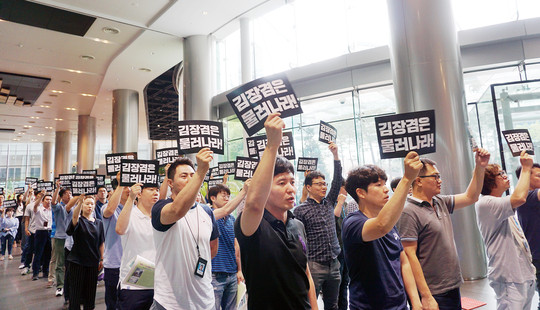The International Federation of Journalists (IFJ) joins its affiliate the Journalists’ Association of Korea (JAK) in supporting the efforts of over 3,000 journalists at South Korea’s public broadcasters who have been in an ongoing strike since Monday, September 4. The IFJ and JAK call on the management at KBS and MBC to start immediate discussions with staff and the unions to resolve journalist concerns over perceived management pressure and interference in reporting.
On Wednesday, August 30, the National Union of Media Workers’ – KBS branch and MBC branch declared that they would be strike on Monday, September 4, and Thursday, September 7, respectively. The KBS branch and the KBS labor union originally voted to strike in November 2016 but temporarily halted the strike in February 2017, while giving the KBS committee the power to reinstate the strike as needed. The MBC branch met on August 30, where 93.2% of members, the highest consent rate ever for the union, voted in favor of the strike.
The strike comes as staff at Korea Broadcasting Service (KBS) and Munhwa Broadcasting Company (MBC) – the two largest public broadcasting services in Korea – grow increasingly frustrated at attacks on the broadcaster’s editorial independence. KBS and MBC staff are calling for KBS CEO Ko Dae-young and MBC CEO Kim Jang-kyum to resign and restore the political independence of the media operations. Over 3,800 journalists, 2,000 from MBC and 1,800 from KBS have been involved in the strike since early September, which has led to programs been cancelled and filming on several productions halted.
In the first week of the strike, a warrant for MBC president, Kim Jang-gyeom was issued after he refused to attend questioning by the labor ministry on unfair labor practices at MBC. The labor ministry launched a special investigation of MBC’s labor practices in June. On September 28, the labor ministry asked the prosecution to indict six former and incumbent MBC senior officials over alleged unfair labor practices against its union.
JAK issued a statement supporting the actions of KBS and MBC staff. In the statement, JAK reiterated the recommendations of KBS and MBC staff including:
- President Koh Dae-Young and President Kim Jang-Kyum shall immediately resign for normalization of public broadcasting stations.
- Colleagues who were unfairly disciplined or dismissed shall immediately recover their positions.
- The Journalists Association of Korea will support members of public broadcasting stations who went on a general strike.
The IFJ said: “We stand in solidarity with our colleagues in Korea, who are fighting to defend the country’s public broadcasters in a critical media battle for independence. Public broadcasters play a vital role in upholding the principles of freedom of expression and the fundamentals of a strong democracy – most importantly, these journalists are strongly defending the rights and the ideal that a public broadcast can never become a mouthpiece of the government. Our colleagues in South Korea have a strong and vibrant trade union history and have put their livelihoods on hold to take this necessary action. We give our full support to them today and tomorrow and until this situation can be resolved and call on the government and management at KBS and MBC to bring this issue to a close and resolve journalist concerns.”
For further information contact IFJ Asia-Pacific on +61 2 9333 0946
The IFJ represents more than 600,000 journalists in 140 countries
Find the IFJ on Twitter: @ifjasiapacific
Find the IFJ on Facebook: www.facebook.com/IFJAsiaPacific
